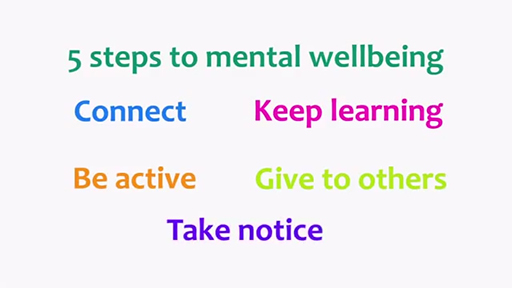1.2 Improving mental well-being
Evidence suggests there are five steps we can all take to improve our mental well-being. If you approach them with an open mind and try them out, you can judge the results for yourself.
Activity 1
Part 1
Watch this NHS video about the five steps to mental well-being.

Transcript
Five steps to mental well-being
[MUSIC PLAYING]
The NHS has further information on their website [Tip: hold Ctrl and click a link to open it in a new tab. (Hide tip)] about what these terms mean:
- Connect – connect with the people around you: your family, friends, colleagues and neighbours. Spend time developing these relationships.
- Be active – you don’t have to go to the gym. Take a walk, go cycling or play a game of football. Find an activity that you enjoy and make it a part of your life.
- Keep learning – learning new skills can give you a sense of achievement and a new confidence. So why not sign up for that cooking course, start learning to play a musical instrument, or figure out how to fix your bike?
- Give to others – even the smallest act can count, whether it’s a smile, a thank you or a kind word. Larger acts, such as volunteering at your local community centre, can improve your mental wellbeing and help you build new social networks.
- Be mindful – be more aware of the present moment, including your feelings and thoughts, your body and the world around you. Some people call this awareness ’mindfulness’. It can positively change the way you feel about life and how you approach challenges.
Can these steps become part of your 5-a-day?
Part 2
Having watched the video and read about the five steps, now think about whether you already do any of these things or whether you could do more. For each step, try to write down one thing you could do to improve your mental well-being.
Comment
You may have written:
- Get out and about a bit more in my neighbourhood and greet the people that I meet.
- Connect more with family and friends by telephone or email as I don’t see them often.
- Learn a new skill or take up a hobby (it doesn’t have to be expensive and you can get information about groups or classes at libraries and community centres, or online).
- Volunteer with a charity.
- Think of the good things that have happened each day – this is a step on the way to mindfulness. Being ‘mindful’ does not happen overnight but with practice and many people find this a useful way to improve their emotional well-being.
We’d now like you to think about the people you support. Their well-being is as important as yours, but how easy is it for them to do any of the things on the five steps list?
Activity 2
Write down in two or three sentences why you think it might be difficult for the person you care for to incorporate the five steps into their life.
Comment
The people you care for may struggle to get in touch with their local community because they find communication difficult or they worry that people will not accept them because of disability or other conditions that they find socially disabling.
They may be inhibited from learning new things because they have told themselves, or been told by other people, that they cannot learn anything new, and they may have got used to a life of inactivity.
Becoming more involved with their community will help the people you care for to see that there are many ways to become ‘tuned in’ to what is going on around them and to help others in lots of ways, big and small.
